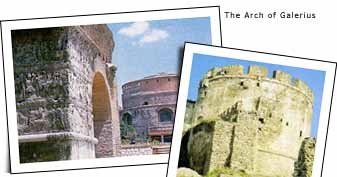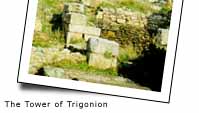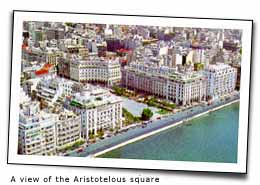Ancient & Roman Times
Thessaloniki, the second largest city in Greece with a population of 1.000.000 inhabitants, is one of the oldest cities in Europe. It was founded in 316 B.C. on a site of old prehistoric settlements dating back to 2300 B.C., by Cassander, king of Macedonia, and was named after his wife, sister of Alexander the Great. Since then, Thessaloniki has become the chief city of Macedonia. In Roman times it boasted the largest harbour in the whole region and stood on the spot where the great road from the north met the main east-west artery. Many foreign merchants lived temporarily or permanently in this rich commercial centre. It was visited also by Saint Paul, who preached the new religion, and who later addressed his two well-known epistles to the Christians of Thessaloniki. Galerius, the ruler of one of the two parts of the Eastern Roman Empire, chose Thessaloniki as his imperial seat in A.D. 300.
Byzantine Times
In Byzantine times, Thessaloniki became a cultural and artistic center second only to Constantinople in Byzantine Empire. From Thessaloniki the brothers Cyril and Methodius began their mission to civilize and preach Christianity to the peoples of the Balkans
 and Great Moravia. In 904 Saracen pirates besieged and captured Thessaloniki.
and Great Moravia. In 904 Saracen pirates besieged and captured Thessaloniki.
The turkish occupation
Thessaloniki was occupied by Ottoman Turks in 1430. During the turkish occupation, which lasted almost five centuries (1430-1912), there were Greek schools in Thessaloniki that struggled
 successfully to preserve the Greek language and literature. The Greek nation fought many times to liberate from the Turks itself. The Greek Struggle for the liberation of Macedonia conducted from the Greek Consulate in Thessaloniki.
successfully to preserve the Greek language and literature. The Greek nation fought many times to liberate from the Turks itself. The Greek Struggle for the liberation of Macedonia conducted from the Greek Consulate in Thessaloniki.
The liberation
In 1912 Thessaloniki was free again to continue its course in history. In 1917 a savaging fire that broke out devastated most of the center of the city and its inheritance. Buildings of rare achitectural design were completely ruined.
 The 20th century
The 20th century
The period between 1922-1924 brought about the exchange of populations following a disastrous Greek military defeat in Asia Minor. The Greeks expelled from Asia Minor and established in Greek Macedonia. The development of Thessaloniki continued its important role in greece by participating in political, financial and cultural activities. After the second World War Thessaloniki became a modern metropolis.